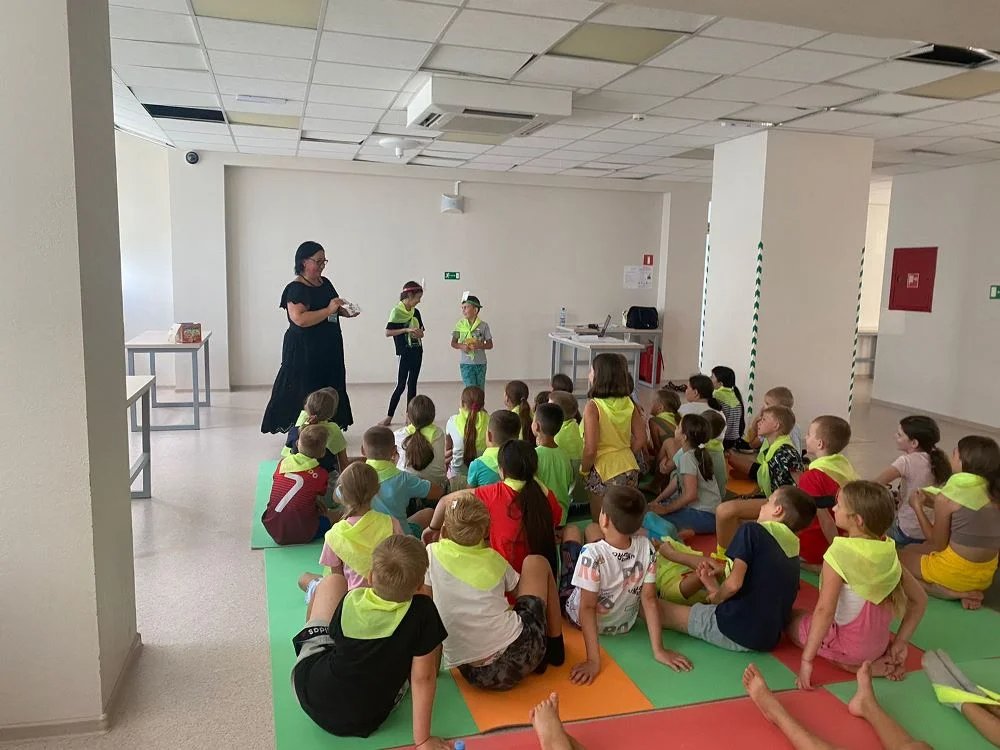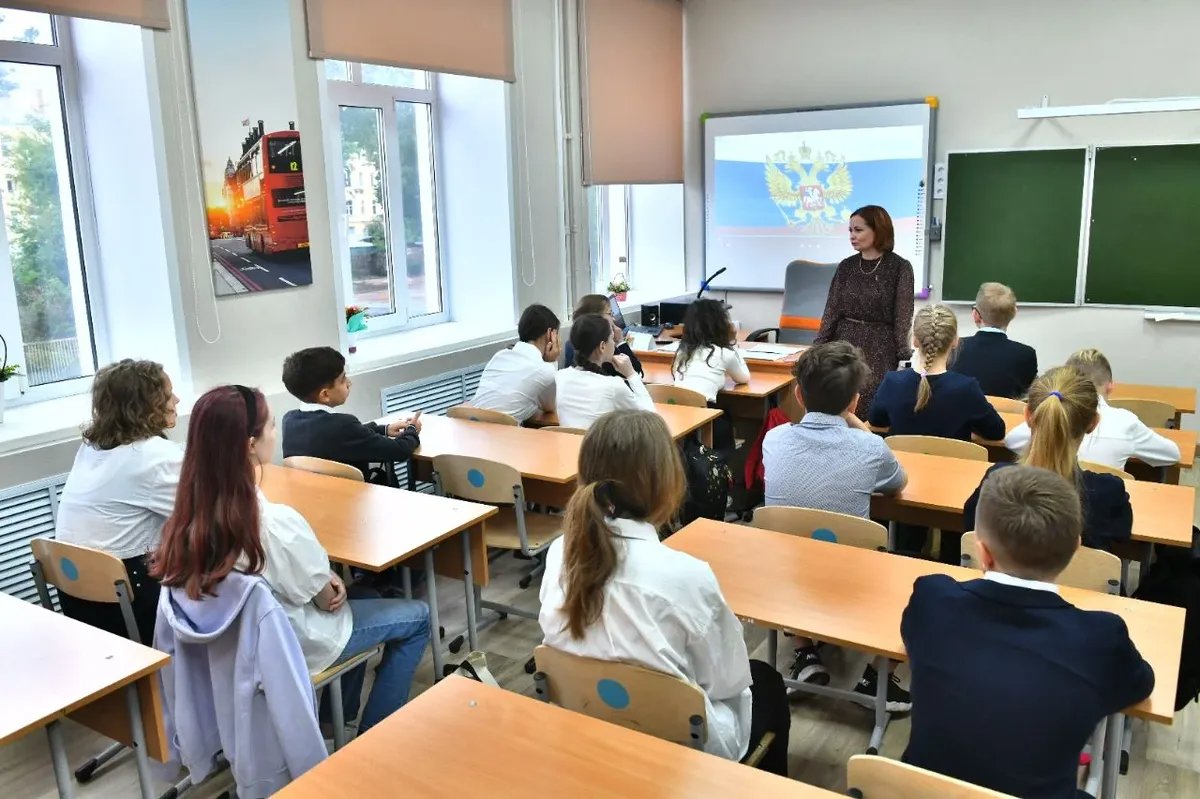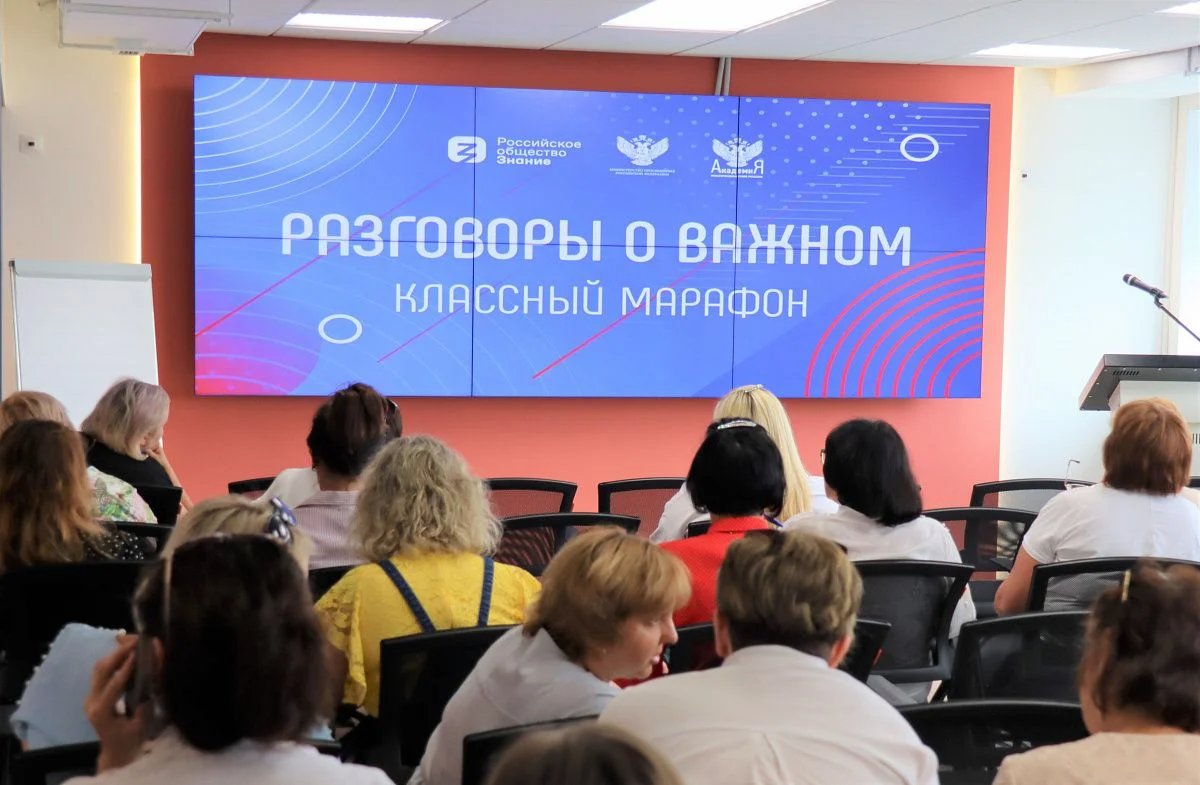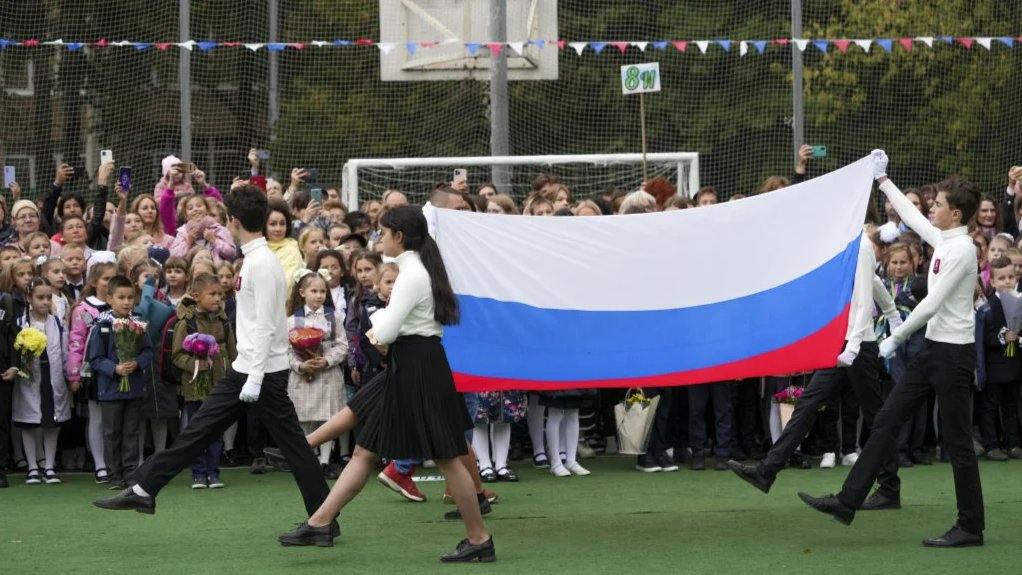The patriotic education plan
“Important Conversations”, a cycle of 32 lessons intended to instil patriotism, was created by the Ministry of Education in May, immediately after they had run a series of lectures about the actions of the Russian military in Ukraine.
This cycle is only one part of the larger plan to brainwash schoolchildren. In addition, the plan includes the creation of an “all-Russian” society for schoolchildren; the elimination of Ukraine and Kyiv from school textbooks; a 14-class module for ninth-graders called “Introduction to New Russian History” (which focuses on the country’s revitalisation under Putin, the annexation of Crimea, and the recognition of the self-proclaimed Donetsk and Luhansk “people’s republics”); a course for eleventh-graders called “Russia: My History”; the installation of “educational advisors” in 34 school districts; and a new initiative — already in practice — to raise the flag and sing the national anthem every Monday before classes.
“Important Conversations”, one of the central parts of this plan, has already started in schools. The class convenes first period on Mondays, immediately after the anthem and flag-raising. In this hour, the state — through its proxies, the schoolteachers — talks to children about what is “important”. We saw what exactly the state deems important this spring, when all schools across the country ran classes on themes such as “hybrid warfare”, “heroes of our time”, “the brotherhood of people”, and the Moscow Department of Education invited Russian Foreign Ministry Spokeswoman Maria Zakharova and Head of RT Margarita Simonyan for a conversation with teachers on how to talk with children about the “special operation” and its aims.
Conversations of government importance
“Important Conversations” was created by the Institute for Strategy of Education Development— it seems that its specialists are now responsible for the brainwashing of the country’s youth. This institute developed the “Introduction to New Russian History” module as well as the spring’s courses on the special operation (or at least some of them). The government allocated 22 million rubles (€363,800) for the development of “Important Conversations”, the IStories investigative outlet reported. A separate page on the “Unified Educational Content” website was created for the courses, as well as a service for classroom teachers and a Telegram channel for news notifications.
Teachers have been preparing for the project’s launch all summer, with both in-person and virtual meetings led by education department officials. Some of the methodological materials were prepared by the Russian Academy of Education’s institute, another flagship organisation in the realm of state curriculum development.
The thematic plan for the cycle was released online over the summer. Thirty-two hours will be devoted to the following topics: memorial days and holidays (Unity Day, Women’s Day, Day of Full Leningrad Liberation from Siege of Nazi Troops); jubilee days for famous figures (this year for the Soviet aerospace engineer Konstantin Tsiolkovsky and children’s book author Sergei Mikhalkov); and various other celebration days: Father’s Day, Mother’s Day, Day of Music, etc.
The logic behind these topics is the same logic that underlies the calendar of educational events which the ministry publishes every year. This year’s calendar has already been released, and there are many overlaps with the new “Important Conversations” curriculum. However, there are also differences: for example, while the “important conversation” scheduled for 24 October focuses on “traditional values,” the calendar lists 25 October as “Day of School Libraries.”
The most interesting part, of course, began on 28 August, when the syllabi for the first two Mondays of the school year — 5 and 12 September — were posted online.
The first important conversation — entitled “Russia: The Land of Opportunity” — seemed fairly unobjectionable. But the second class, whose topic is “Homeland and Patriotism”, gave rise to many questions from parents and teachers.
The curriculum for the lesson block varies by age group, with one syllabus for first- and second-graders; one for third and fourth, one for fifth through seventh, one for eighth and ninth, and one for tenth and eleventh.
But they are all built on the same basic model. They begin with a theoretical portion (a story about how powerful, plentiful, and wonderful our Russia is); then move into something more interactive (a quiz or discussion of proverbs and riddles); and then finally end with a section on the “special military operation”.
Following these three parts, there is a reflection period in which children are encouraged to think about what they’ve learned.

Photo: The Institute of Education Development
Although the materials are framed only as “recommendations,” the Ministry of Education knows all too well that its teachers don’t like to improvise. After all, lesson plans are the most in-demand of all pedagogical materials.
Here, the materials are ready for immediate use: the lesson scripts come ready to go with presentations, videos, and posters. One needn’t do anything more than turn on the video, read the text out loud and ask the questions from the worksheet. Everything has been designed for the lazy, burnt-out, unthinking and obedient teacher.
On real patriotism
What caught the eye of concerned parents and teachers was the third part of the lesson. Even young children have already begun to receive the message that “if you love your homeland, you’ll give up your life for it”.
By third grade, students remember (or their teachers remind them of) proverbs such as “For your homeland-mother, it is not scary to die.” And from 5th grade on, all lesson plans include the following text:
“Manifestations of real patriotism can be seen today first and foremost in the special military operation. President V.V. Putin announced the start of this operation on 24 February of this year.
In his speech, the president noted: “Circumstances demand our decisive and immediate action. The people’s republics of Donbas have turned to Russia, requesting help.”
The goals of the special military operation include: protecting the population of Donbas, who have been subject to bullying and harassment by the Kyiv regime; disarming Ukraine; preventing the establishment of NATO bases on Ukraine’s territory.
The Russian armed forces, together with the forces of the Donetsk and Luhansk People’s Republics, are actively working to achieve these goals. The enormous aid —both military and nonmilitary — that the Ukrainian government has received from the West has dragged out the conflict, increasing the number of victims of the operation.”
Another example of “real patriotism” takes the form of a short story about three heroes. One of them, captain Alexander Rodionov, “discovers a group of Ukrainian nationalists and decides to push them into a minefield”, and two others, Marat Khalikov and Maria Miroshnichenko, save wounded soldiers, risking their own lives.
The text is identical for all classes, but the discussion questions vary slightly. The oldest students are asked to write an essay called “After the important conversation”. For 8th- and 9th-graders, the task is to “think up a topic of conversation about homeland, country, and Russia. To what end should this conversation lead?”
Even from a methodological point of view, the task seems impossible: what will be the end point of a conversation that has not yet happened? Could a student propose as a topic of conversation “What to do if your homeland is in the wrong?”
Or “Russia without Putin — path of development?” Or “Why is everyone leaving our cities?” What ends do these conversations lead to? A call to the commissioner of juvenile delinquency cases? Or is it expected that the students will simply clasp their cherubic hands and repeat the maxim that “to love your country is to serve your country”?
The text about the feats of the special military operation leads to a stunning conclusion: “In the course of the special operation on the territory of the Donetsk and Luhansk people’s republics, our soldiers and officers have achieved feats which ensure the success of our forces.” Actually, simple logic suggests that the success of our forces would be ensured by accurate intelligence, superior modern weaponry, strategic planning, intelligent leadership, good training regimes for the armed forces and other aspects of a modern military campaign. But no, we see here that all emphasis is placed on “feats”.
Perhaps this sheds light on what has happened in eastern Ukraine in the past week.

Photo: Official portal of the city of Yaroslavl
I’ll put you down as a ‘no’
Parents raged. They raged silently. Like the hare in the famous fable about the dragon who invites everyone to come to his house for dinner. The animals cry and march to be eaten — all but the hare, who asks: “And what if I don’t come?” If you remember, the dragon says calmly, “Okay, I’ll put you down as a ‘no’ then.”
Parents are beginning to find out if their children can follow the hare’s example. They are writing letters requesting exemptions for their children from attending these classes. The ministry of education, not surprisingly, has said that no one is exempt — because these lessons are part of the school curriculum, and students, according to the law on education, must learn the material on the curriculum.
The oppositional “Teachers’ Alliance” and “Soft Power” movement have called on parents and students to boycott “Important Conversations”. They have compiled a memo about how to refuse the classes, including templates for letters both from parents and from students themselves. Emilia Slabunova, a representative of the Yabloko party, wrote a long post helping parents cite legal statutes in requesting exemptions for their children.
All this, however, was after the most surprising thing happened: the material for the “Important Conversation” scheduled for 12 September was removed from all sites on 5 September. At 6:00 on 6 September, it reappeared, but the military portion of the lesson was gone.
Gone were the proverbs about death for the homeland, gone was the “special military operation”, and gone were the patriotic feats.
The dragon said, “Okay, I’ll put you down as a ‘no’.”
White-trunked birches
What remains? Everything is the same, but without the military part. It’s very boring: hours of banal, interminable lesson plans, for which it certainly was not worth spending so much state money.
The creators of the curriculum did not outdo themselves: they dutifully churned out the same empty blather with which they were indoctrinated in the Soviet times. “No one can remain indifferent when faced with the nature of our country,” they inform first- and second-grade students. “It is rich and varied: the harsh, severe North, the impassable taiga, where reign the brown bear and lynx, the wolverine and the wolf, the tender white-trunked birches of the forest.
“A person who loves his country cannot remain indifferent to its nature. He always admires it, even if it is a boundless steppe, a desiccated desert, an interminable tundra.” Any graduate of the Soviet education system can manufacture reams of text like this, empty of both thought and emotion. And, by the way, is love for the motherland compromised if one admires the beauty of the white cliffs of Albion, the breadth of the Amazon, where the crocodiles reign, and the mysterious mists in the tropical forests of Costa Rica?
In the third- and fourth-grade class, there is an excerpt from Ushinsky about the homeland, an excerpt from Likhachev about good deeds, and an excerpt from “Word About the Death of the Russian Land”. (This one is attributed, vaguely, to an “Ancient Text” — evidently so that the children won’t ask too many questions.)
There are Soviet songs: “From What Does the Homeland Begin”, “I, You, He, She — Together a Whole Country”.
For 5th- to 7th-graders, there’s Yesenin’s “Here’s to you, my beloved Rus’.” For 8th- to 9th-graders, a text about how our country is the largest, oldest, deepest, and richest. Here, everything is jumbled together: cosmonaut Padalka set a record for time spent in outer space; the Urals are the oldest mountains; Russia is the world’s leading exporter of nitrogen fertilisers invented television and electric lighting. “And this is far from all the proof of our country’s richness and singularity. Russians have many reasons to be proud and many reasons to love their country.”
For 10th- and 11th-graders, “feelings of patriotism” are imbued in “The Tale of Igor’s Campaign”, an ancient Russian monument to literary art; Pushkin’s poem “Poltava” and his novel “The Captain’s Daughter”; Lermontov’s poem “Borodino”, Gogol’s novella “Taras Bulba”. Everything proves to us the depth of love for our native land and concern for her future”.
In the material for one of the next lessons — for 26 October, “Day for the Elderly” — we find the following quiz question: “In the text “When will the real day come?”, written in 1860, there are the following lines: “I arrived at the conviction that man is to blame for all his unhappiness — either because he wasn’t careful, or because he could not satisfy himself with little, or because he did not direct sufficient respect to the lows and to the wishes of his elders” Name the author. Answer: Nikolai Dobrolyubov.
The funny thing, though, is that this quote is removed from its context; in the text of the article, these words belong to a “forward-thinking” person with a “burning thirst for good deeds”, but in his own actions “the meekest and most harmless of men”; he uses these words to justify his passivity. Now, this lesson plan has also been removed from the website.
Quotations out of context, distorting the author’s position (in the case of Dobrulyubov), sources without attribution (“Word About the Death of the Russian Land”), quotes without sources (“Homeland, birthmark of my soul” — the name of the class for the youngest schoolchildren). Patterns, cliches, repetition of the most general passages from the textbooks of natural history, history, and literature — they are all unbearably superficial and mind-numbing.

A workshop for classroom teachers. Photo: The Ural State Pedagogical University
Money down the drain
Civil society considers public indignation to be the main reason why these materials were removed from public access sites.
This is all well and good, because it gives hope: if all hares are no longer afraid to ask the dragon, “And if I don’t come?,” the dragon will have to put down more and more of his guests as “nos”.
It’s possible, of course, that there may be another reason: perhaps given the failure on the front lines (of 5-6 September), which in subsequent days turned into a more major military defeat, attracting the attention of children to the “special operation” would mean raising a number of unneeded questions from both children and their parents. And that’s not the most opportune right now.
Right now, it would be better for society not to think too much about the war — it should instead ride the largest ferris wheel in Europe, celebrate City Day, relish stability. The war — that’s somewhere else, it’s not ours, it doesn’t concern us and will not touch us.
Or maybe the point is the low quality of these educational materials: they are emptiness wrapped in pretty paper, with beautiful presentations, expensive videos and sites, methodological seminars and video conferences with military officials. And here it’s impossible not to see another sad parallel, between the second most powerful army in the world and the best educational system in the world: inside is emptiness. Money is wasted on propaganda, is poured down the drain, on drivel packaged in loud words about patriotism.
In short, regardless of the reasons that swayed the Ministry of Education and the Institute for Strategy of Education Development, it is good that they decided to remove military propaganda from these educational materials (materials which were, of course, developed expressly to disseminate military propaganda!).
And not just because the children will be spared from it, but also because the system, having gone too far, has doubled back. This is an important experience for Russian civil society — or for what remains of it. What if saying no works some other time?
Join us in rebuilding Novaya Gazeta Europe
The Russian government has banned independent media. We were forced to leave our country in order to keep doing our job, telling our readers about what is going on Russia, Ukraine and Europe.
We will continue fighting against warfare and dictatorship. We believe that freedom of speech is the most efficient antidote against tyranny. Support us financially to help us fight for peace and freedom.
By clicking the Support button, you agree to the processing of your personal data.
To cancel a regular donation, please write to [email protected]

